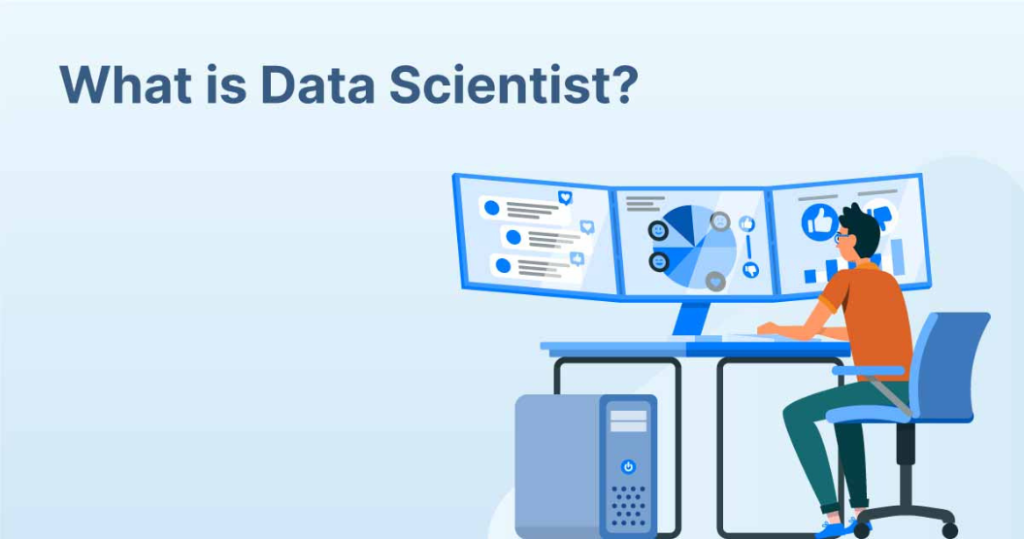What Is a Data Scientist? Salary, Skills, and How to Become One

Introduction to Data Science
Data science is a multifaceted discipline that merges various fields such as statistics, mathematics, computer science, and domain expertise to extract actionable insights from data. In today’s data-driven world, organizations across industries rely on data scientists to transform raw data into valuable insights that drive strategic decision-making, enhance operational efficiency, and foster innovation. From analyzing customer behavior to optimizing supply chain logistics, data scientists play a pivotal role in helping businesses uncover hidden patterns, forecast trends, and gain a competitive edge in the market.
Salary Insights for Data Scientists
The compensation for data scientists can vary significantly based on a multitude of factors, including experience level, educational background, geographic location, industry, and company size. While entry-level data scientists may start with salaries ranging from $80,000 to $100,000 annually, seasoned professionals with several years of experience and advanced degrees can command salaries well exceeding $150,000 per year, particularly in tech hubs like Silicon Valley or financial centers like New York City. Additionally, factors such as bonuses, stock options, and benefits packages can further contribute to the overall compensation package for data scientists.
Skills Required for Data Scientists:
1. Statistical Analysis: Data scientists must possess a robust understanding of statistical methods and concepts to effectively analyze and interpret complex datasets. From basic descriptive statistics to advanced inferential techniques, proficiency in statistical analysis enables data scientists to identify correlations, trends, and anomalies within data, providing valuable insights for decision-making purposes.
2. Programming Languages: Proficiency in programming languages such as Python, R, SQL, and Java is fundamental for data scientists to manipulate, process, and analyze data efficiently. These languages serve as the backbone for data manipulation, statistical modeling, and machine learning tasks, allowing data scientists to leverage a wide array of libraries and frameworks tailored for data analysis and predictive modeling.
3. Machine Learning: Machine learning forms the core of many data science projects, enabling data scientists to develop predictive models, classify data, and extract valuable patterns from datasets. Familiarity with machine learning algorithms such as linear regression, decision trees, support vector machines, and neural networks empowers data scientists to tackle a diverse range of predictive modeling tasks and optimize business processes through data-driven insights.
4. Data Visualization: Data visualization is a crucial aspect of data science, as it facilitates the communication of insights and findings to stakeholders in a clear and intuitive manner. Proficiency in data visualization tools and libraries such as Tableau, Power BI, Matplotlib, and Seaborn enables data scientists to create informative charts, graphs, and dashboards that convey complex information effectively, enabling informed decision-making at all levels of the organization.
5. Problem-Solving: Data scientists must possess strong problem-solving skills to address complex analytical challenges and devise innovative solutions to real-world problems. Whether it’s optimizing marketing campaigns, predicting customer churn, or improving product recommendations, data scientists leverage their analytical prowess and creative thinking to derive actionable insights and drive meaningful business outcomes.
6. Domain Knowledge: While technical skills are essential for data scientists, domain expertise in specific industries or business domains further enhances their effectiveness in generating actionable insights. Whether it’s finance, healthcare, retail, or manufacturing, data scientists with domain knowledge can better understand business requirements, contextualize data analysis, and provide relevant recommendations tailored to the unique challenges and opportunities within their respective industries.
How to Become a Data Scientist:
1. Educational Background: Most data scientists hold a bachelor’s or master’s degree in fields such as computer science, statistics, mathematics, engineering, or a related quantitative discipline. However, with the increasing availability of online courses, boot camps, and self-study resources, individuals from diverse academic backgrounds can transition into data science roles with the right combination of skills and experience. Advanced degrees, such as a master’s or Ph.D. in data science or a related field, can also provide a competitive advantage for those seeking senior or specialized roles in the field.
2. Gain Relevant Skills and Experience: Acquiring proficiency in programming languages, statistical analysis, machine learning techniques, and data visualization tools is essential for aspiring data scientists. Online courses, tutorials, coding boot camps, and self-directed learning can help individuals develop these skills at their own pace. Additionally, gaining practical experience through internships, freelance projects, or participation in hackathons and data science competitions can provide hands-on experience and demonstrate proficiency to potential employers.
3. Build a Portfolio: Building a strong portfolio showcasing your data science skills and projects is crucial for establishing credibility and demonstrating your expertise to potential employers. Include examples of data analysis projects, machine learning models, data visualizations, and any other relevant work that highlights your ability to solve real-world problems using data-driven approaches. A well-curated portfolio can serve as a powerful tool for attracting recruiters’ attention and securing interviews for data science positions.
4. Networking: Networking with professionals in the data science community can provide valuable insights, mentorship, and job opportunities. Attend industry conferences, workshops, and meetups, join online forums and communities, and connect with data science professionals on platforms like LinkedIn to expand your network and stay informed about industry trends and job openings. Building relationships with industry professionals can open doors to hidden job opportunities and provide valuable guidance throughout your data science career journey.
5. Apply for Jobs and Interviews: Once you’ve acquired the necessary skills and built a strong portfolio, start applying for data scientist positions that align with your interests and career goals. Tailor your resume and cover letter to highlight your relevant experience, skills, and accomplishments, and customize your application for each job opportunity. Prepare for technical interviews by practicing coding challenges, data analysis exercises, and discussing your projects and problem-solving approach. Be ready to showcase your technical skills, domain knowledge, and communication abilities during the interview process to impress potential employers and land your dream job as a data scientist.
In summary, becoming a data scientist requires a combination of education, skills, practical experience, and networking. By continually learning and staying updated on the latest trends and technologies in data science, you can position yourself for success in this exciting and rapidly evolving field. With strong analytical skills, programming expertise, and a passion for problem-solving, you can embark on a rewarding career as a data scientist and make a meaningful impact in the realm of data-driven decision-making.
Frequently Asked Questions (FAQs) for Data Science Career Guide:
1. What educational background is required to become a data scientist?
Data scientists typically hold a bachelor’s or master’s degree in fields such as computer science, statistics, mathematics, engineering, or a related quantitative discipline. Advanced degrees, such as a master’s or Ph.D., can provide a competitive advantage, particularly for senior or specialized roles in the field.
2. What skills are essential for success as a data scientist?
Essential skills for data scientists include proficiency in programming languages such as Python, R, SQL, and Java, statistical analysis techniques, machine learning algorithms, data visualization tools, problem-solving abilities, and domain knowledge in specific industries or business domains.
3. How can I gain practical experience in data science?
Practical experience in data science can be gained through internships, freelance projects, participation in hackathons and data science competitions, and self-directed learning using online courses, tutorials, and coding boot camps. Building a strong portfolio showcasing data science projects and skills is essential for demonstrating proficiency to potential employers.
4. What is the salary range for data scientists?
The salary range for data scientists varies based on factors such as experience, education, location, industry, and company size. Entry-level data scientists may start with salaries ranging from $80,000 to $100,000 annually, while experienced professionals can command salaries well exceeding $150,000 per year, particularly in high-demand industries and geographic areas.
5. How can I network with professionals in the data science community?
Networking with professionals in the data science community can be done through attending industry conferences, workshops, and meetups, joining online forums and communities, and connecting with data science professionals on platforms like LinkedIn. Building relationships with industry professionals can provide valuable insights, mentorship, and job opportunities in the field of data science.



